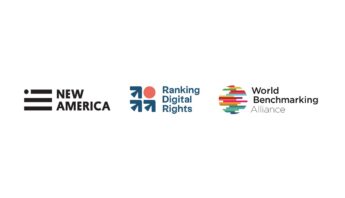Request for Proposals: Consultancy for completion by 31 January 2020 (PDF)
Deadline: 30 October 2019
Submit to: stichting@rankingdigitalrights.org
Stichting Ranking Digital Rights Network (SRDRN), a start-up NGO registered in the Netherlands and affiliated with the Ranking Digital Rights (RDR) program at New America, invites consultants to submit proposals to conduct a scoping study that will inform subsequent funding proposals for SRDRN’s Europe-focused work. The study would accomplish this goal by mapping how the research produced by RDR (primarily the methodology and findings of the RDR Corporate Accountability Index) can help support policy analysis and advocacy, as well as new lines of research and investigation, among European organizations that focus on digital rights, particularly freedom of expression and privacy.
Consultants are invited to submit proposals describing how they would map the European digital rights policymaking, research, and advocacy space; identify opportunities that would leverage the unique methodology, research findings, and recommendations generated by the RDR Index; and make recommendations for how SRDRN could most effectively leverage RDR’s work to make a useful and effective contribution to the European discourse about how to foster and protect digital rights. The consultant’s final report should transform the mapping and recommendations into strategic priorities and relevant objectives, as well as desired outcomes and key performance indicators, that could serve as the basis for a grant proposal to support the launch of SRDRN’s Europe-focused work.
The report should be concise and practical, identifying concrete opportunities for SRDRN to support or participate in Europe-focused digital rights advocacy and research. The report should include recommended activities that could be carried out by a small team that could realistically be expected to achieve the proposed outcomes.
The report’s intended audience would be RDR staff, SRDRN staff, the SRDRN board, potential funders, and partners. It should be completed no later than the end of January 2020.
Proposals should include a description of activities and deliverables, a timeline, and a budget describing rate and any other expenses, up to 12,500 EUR.
Experience and qualifications:
-
-
- Familiarity with the Ranking Digital Rights Corporate Accountability Index and its methodology.
- Demonstrated familiarity – as well as direct experience working with – major digital rights policy advocacy and research organizations in Europe.
- Experience with the design and/or management of digital rights–related research and/or policy advocacy programs in Europe.
-
Deadline: 30 October 2019
Background: A number of organizations have expressed interest in using RDR’s data and methodology for Europe-focused advocacy and research related to how companies should most effectively be incentivized or compelled to respect and protect users’ rights. SRDRN was created to support such work but a scoping study is required to determine where the greatest needs and demands are, and how we should craft SRDRN’s scope and strategy for launching and building its Europe-focused work in order to bring greatest value to the field and avoid duplicating the work of others.
Stichting Ranking Digital Rights Network (SRDRN) is an NGO registered in the Netherlands. SRDRN presently has no full-time staff and has not yet conducted any programmatic activities. Once programmatic funding can be obtained, SRDRN’s work is intended to focus on two areas: 1) Building a global research and advocacy network focused on corporate accountability for digital rights that builds upon the methodology and data produced by the Ranking Digital Rights (RDR) program at New America. This will be accomplished by supporting partner organizations that contribute directly to research and analysis for the RDR Corporate Accountability Index and also by supporting projects that focus on related questions of ICT sector accountability for digital rights. 2) Europe-focused work: Stakeholder engagement and advocacy in Europe informed by RDR research findings, and establishment of research partnerships with European organizations.
Ranking Digital Rights (RDR) is housed at New America, a think tank headquartered in Washington, D.C. RDR’s mission is to promote freedom of expression and privacy on the internet by creating global standards and incentives for companies to respect and protect users’ rights. This is accomplished primarily through regular production of the RDR Corporate Accountability Index, which evaluates the world’s most powerful internet, mobile, and telecommunications companies on their policies and practices affecting users’ freedom of expression and privacy. In addition to conducting all the activities necessary to research and produce the RDR Index on a regular basis, RDR also conducts related research for methodology revision and development, and carries out necessary activities to enable the media and other stakeholders – including civil society, policymakers, investors, and researchers – to use the RDR data.
Examples of questions the consultant might ask of advocacy organizations, researchers, and policymakers include:
-
- What types of research data about company policies and practices affecting freedom of expression and privacy would help you make a stronger case for or against particular policies affecting digital rights? Or for policymakers: What types of research data would help you formulate policy related to corporate respect and protection of users’ privacy and freedom of expression?
- There are many different groups working on digital rights advocacy in Europe now. There are also many research institutions and EU-funded research projects. Is there a need for specialized research organizations such as RDR to provide advocacy organizations (or policymakers) with the research data and analysis you need to make your case (or to formulate effective policies that achieve their goals without creating unintended consequences)? Or do you feel satisfied with the amount of data and analysis available to make your policy arguments (or recommendations or decisions)?
- Have you used RDR’s data or analysis for advocacy, or as a starting point for further research? Why or why not? How might we make RDR’s research, data, and methodology more useful to advocates or researchers in Europe like yourself?
- How might we make RDR’s research, data, and methodology more useful to policymakers?
- RDR’s Index data reveals very uneven and inconsistent levels of disclosure by European telcos about their collection and use of personal data. This points to areas where existing regulations fall short in compelling adequate corporate transparency and accountability. Do you find such data useful in formulating policy or policy positions (for example, in considering what the e-privacy proposal needs to cover)?
- RDR’s Index results point to a number of ways that certain laws are either hindering companies from maximizing respect for users’ rights, or compelling them to violate rights. In other cases the results point to a lack of regulatory requirements to be more transparent and accountable to users, or regulatory uncertainty that discourages companies from disclosing more information to users about what happens to their personal data or why certain speech is restricted and by whose authority.
- For advocates: Do you think that such information is useful to your advocacy work? Have you used it in your advocacy? If not, why not? How can we help you make better use of the research and analysis that we generate?
- For policymakers: Do you think that such information is useful to determine what policy interventions are necessary and/or the extent to which a given law or regulation is ultimately contributing to or detracting from the protection and exercise of human rights?
-
- If somebody were to apply RDR’s methodology to evaluate companies operating only in Europe, or in a specific country or set of countries, how might that be helpful for your advocacy work? What assistance or support would you need to use the data produced by such a project?
- For research organizations: If you had adequate support, would it be meaningful for your organization or for others in your field to use RDR’s methodology to rank companies operating in Europe, or in a specific country or set of countries? What support would be needed in order to implement such work?



